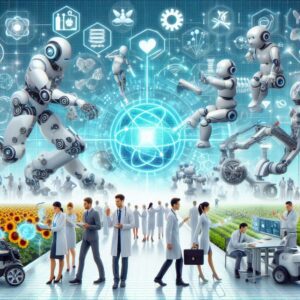Table of Contents
- Introduction to AI
- How AI Works: A Brief Overview
- 10 Amazing Ways AI is Changing the World
- 3.1. Healthcare Advancements
- 3.2. Smarter Business Decisions
- 3.3. Enhanced Customer Service
- 3.4. Autonomous Vehicles
- 3.5. AI in Education
- 3.6. Financial Forecasting
- 3.7. Personalized Marketing
- 3.8. AI in Cybersecurity
- 3.9. Smart Home Technology
- 3.10. AI in Creative Industries
- Ethical Considerations of AI
- The Future of AI
- Conclusion
Introduction to AI
Artificial Intelligence (AI) is no longer just a futuristic concept—it’s reshaping industries, automating tasks, and enhancing human capabilities. From healthcare to finance, AI is driving innovation at an unprecedented pace.
In this guide, we’ll explore 10 amazing ways AI is transforming our world, its underlying mechanisms, ethical concerns, and what the future holds for this groundbreaking technology.
How AI Works: A Brief Overview
AI mimics human intelligence using machine learning (ML), deep learning, and neural networks. By processing vast amounts of data, AI systems can:
- Recognize patterns
- Make predictions
- Automate complex tasks
- Continuously improve through feedback
For example, AI-powered chatbots like ChatGPT use natural language processing (NLP) to understand and respond to human queries effectively.

10 Amazing Ways AI is Changing the World
1. Healthcare Advancements
AI is revolutionizing diagnostics, drug discovery, and personalized medicine. Tools like IBM Watson Health analyze medical data to detect diseases early, while AI-driven robotics assist in precision surgeries.
Source: Nature – AI in Healthcare
2. Smarter Business Decisions
Companies leverage AI-powered analytics to optimize operations, forecast trends, and enhance decision-making. Platforms like Google Analytics AI provide real-time insights for better strategies.
Source: Harvard Business Review – AI in Business
3. Enhanced Customer Service
AI chatbots (e.g., Zendesk AI) handle customer inquiries 24/7, reducing response times and improving satisfaction. Sentiment analysis helps businesses understand customer emotions better.
Source: Forbes – AI in Customer Service
4. Autonomous Vehicles
Self-driving cars (e.g., Tesla Autopilot) use AI, sensors, and computer vision to navigate safely. This technology promises fewer accidents and more efficient transportation.
Source: MIT Technology Review – Self-Driving Cars
5. AI in Education
AI-powered platforms like Khan Academy personalize learning experiences by adapting to students’ needs. Automated grading systems save educators time while improving accuracy.
Source: EdTech Magazine – AI in Education
6. Financial Forecasting
Banks and investment firms use AI algorithms to predict market trends, detect fraud, and automate trading. Tools like Bloomberg Terminal AI enhance financial decision-making.
Source: Investopedia – AI in Finance
7. Personalized Marketing
AI analyzes consumer behavior to deliver hyper-targeted ads. Platforms like Google Ads AI optimize campaigns in real-time for maximum ROI.
Source: HubSpot – AI in Marketing
8. AI in Cybersecurity
AI detects and prevents cyber threats faster than traditional methods. Darktrace’s AI identifies anomalies in network traffic to stop breaches before they happen.
Source: CSO Online – AI in Cybersecurity
9. Smart Home Technology
Voice assistants like Amazon Alexa and Google Home use AI to automate home tasks, from adjusting thermostats to managing security systems.
Source: CNET – Smart Home AI
10. AI in Creative Industries
AI tools like DALL·E and ChatGPT assist in content creation, from generating art to writing scripts, expanding creative possibilities.
Source: The Verge – AI Creativity
Ethical Considerations of AI
While AI offers immense benefits, concerns include:
- Job displacement due to automation
- Bias in AI algorithms leading to discrimination
- Privacy risks from data collection
Regulations like the EU AI Act aim to ensure ethical AI development.
Source: Wired – AI Ethics
The Future of AI
Experts predict AI will:
- Augment human intelligence rather than replace it
- Improve sustainability through smart energy management
- Enable breakthroughs in quantum computing
Source: McKinsey – Future of AI
Conclusion
AI is undeniably transforming industries, enhancing efficiency, and opening new possibilities. By understanding its applications and ethical implications, we can harness its power responsibly.
Stay ahead of the curve by embracing AI innovations—whether in business, healthcare, or daily life.
What’s the most exciting AI development you’ve encountered? Share your thoughts below!